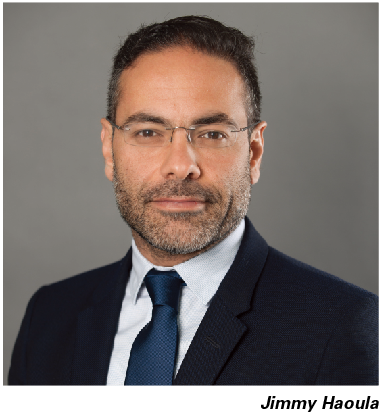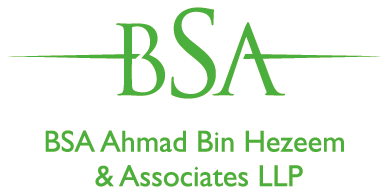Published in Asian-mena Counsel: Deals of the Year 2019

The outlook for acquisition activity in the region is positive, though much will depend on the impact of Covid-19.
By Jimmy Haoula, BSA Ahmad Bin Hezeem & Associates
Despite continuing geopolitical tensions and the ongoing Covid-19 outbreak, M&A activity is poised to remain positive across the Middle East. Volatile oil prices and an overdependence on oil revenues are driving regional governments to implement reforms and initiatives to diversify their economies. These efforts are creating increasingly attractive regulatory and business environments for local and international entities, established players and newcomers to the region.
M&A markets in the UAE and KSA have until now remained healthy. Significant deals such as the merger of Saudi British Bank and Alawwal bank, as well as continued inbound and outbound deals in the UAE, are indicative of a dynamic M&A market across the GCC.
Furthermore, local and international companies are becoming increasingly conscious of the young and tech-savvy populations across the region. These companies are keen to invest in emerging technologies with attractive growth potential. A recent example being Uber’s acquisition of ride-hailing app Careem last year for US$3.1 billion.
It is noteworthy however that actual M&A activity in the region primarily consists of acquisitions, rather than mergers. This is in large part due to the lengthy and difficult approval processes such mergers entail.
The full ramifications of the evolving Covid-19 outbreak remain to be seen. However, it is already clear that M&A activity across the region and globally will surely be impacted.
Legislative reform
Nonetheless, across the Middle East, much needed regulatory reforms are being implemented at a rapid rate. These developments are undoubtedly stimulating M&A activity, improving ease of doing business and attracting foreign investment.
The UAE is renowned for its strategic location, world class infrastructure and favourable business environment. Nonetheless, forward thinking legislators are aware that further progress must be made to maintain the UAE’s position as a leading hub for business in the Middle East.
The keystone legislation governing M&A activity in the UAE is the Commercial Companies Law. Revised in 2015, this law introduced modernising changes in various areas of corporate structuring.
Further reforms have been introduced in recent years which augment this regulatory framework. These include the implementation of a new Foreign Direct Investment Law (FDI Law). The FDI Law now allows up to 100 percent foreign ownership in more than 122 economic activities across 13 sectors. BSA are at the vanguard of this evolving landscape, assisting clients in taking advantage of this new law.
In addition, the UAE introduced a new Bankruptcy Law in 2016. This was brought in to encourage a ‘rescue culture’ for distressed businesses and to closer align the UAE’s bankruptcy regime with international counterparts.
The UAE also introduced a new law on the pledge of movable assets as a guarantee for debts. This law allows greater flexibility to corporations, allowing them to secure proper funds while guaranteeing the financing parties’ rights.
The recent acquisition of popular UAE app The Entertainer (by Bahraini based GFH Financial Group); the acquisition of UAE based online classified ads website Dubizzle (by South African based Naspers); and the acquisition of the UAE portion of food delivery business Zomato (by German based Delivery Hero) are all illustrative of the increased appetite among regional and international companies for investing in the UAE. The ever-improving regulatory environment will only help in this regard.
In KSA, similar efforts are being made to improve its attractiveness as a hub for regional and international business. A main strategic aim of its Vision 2030 is to transform its oil-based economy into a knowledge-based economy.
To facilitate this ambition, necessary regulatory reform has accelerated at an unprecedented rate. Among the many important developments, KSA has recently approved the new Professional Companies Law, as well as new franchise regulations. Special Economic Zones are also now being established across KSA with the first zone being set up at King Khalid International Airport in Riyadh. In March 2019, oil giant Saudi Aramco bought 70 percent of SABIC, valued at US$70 billion. This landmark deal further signals the extensive diversification efforts in the Kingdom.
Summary
Regional and international companies have continued to consolidate, while always seeking to increase their market share and penetration. Acquisitions have hitherto facilitated time-efficient growth strategies. New product lines and markets have been accessed almost instantaneously, and balance sheets have enjoyed a welcome boost through carefully executed transactions.
In addition to the regulatory reforms, disruptive technologies have inspired M&A in the Middle East. Businesses have sought to obtain new capabilities and opportunities which will keep new market entrants at bay. To adapt to new technologies and fast-growing sectors, companies have needed to diversify their business portfolios.
The varying jurisdictions across the GCC are developing and evolving quickly. Great strides are clearly being made. Provided the economic impact of the Covid-19 outbreak is limited, economically stimulating M&A activity will likely continue across the region going forward.

![]() Click Here to read the full issue of Asian-mena Counsel: Deals of the Year 2019.
Click Here to read the full issue of Asian-mena Counsel: Deals of the Year 2019.


















